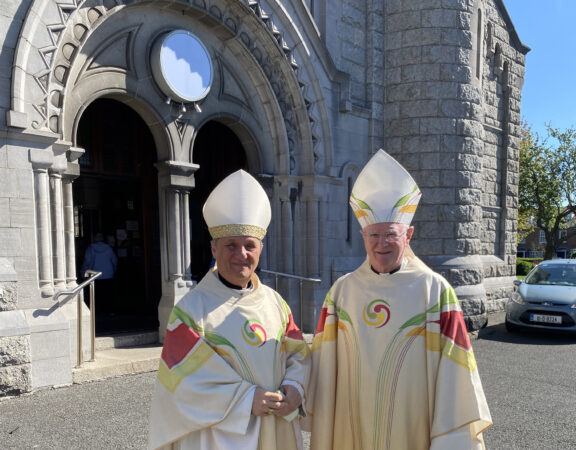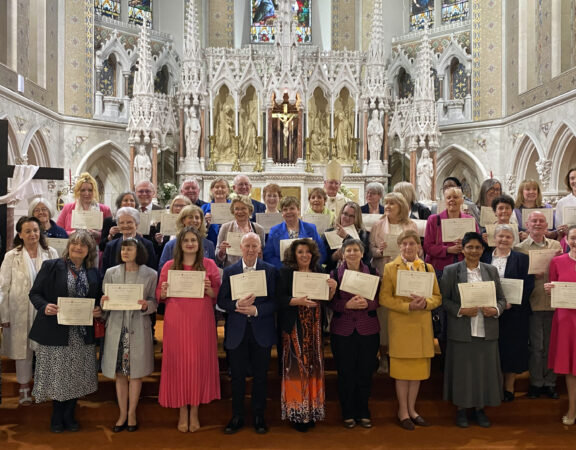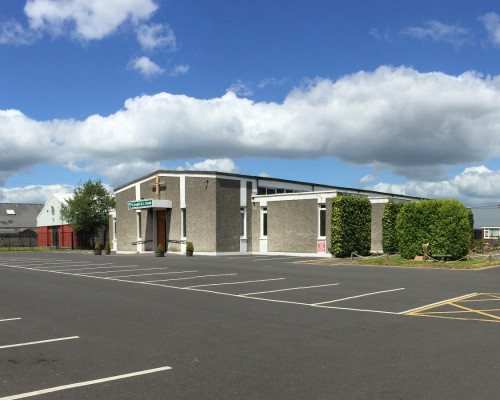Homily notes of Archbishop Diarmuid Martin, Archbishop of Dublin at Mass following the refurbishment of St. Laurence’s Church, DIT Campus, Grangegorman, Dublin.
“The first reading from the Prophet Isaiah and the reading from Saint Paul challenge us, as believing Christians, about how we live our faith and about our attitude to the world around us and its people.
They are very appropriate readings as we dedicate this newly refurbished Church to its changed mission in the exciting project of shaping the Dublin Institute of Technology of the future. It is also fitting that we remember the history which is imbedded in this building which served the community of Saint Brendan’s Hospital and the wider Grangegorman local community who have worshipped here over many years since the Church was built. This Church was one of the few points of contact between the, sadly, socially isolated and forgotten community of the hospital and the wider community. My hope is that this building will continue to find such a role in the future. The academic community belongs within and serves and enhances the wider community and indeed learns from the wider community.
A Church building, like the Church itself, is never a closed or isolated building or community. A Church which becomes a comfort zone for the likeminded ceases to be truly the Church of Jesus Christ. Even at the time of the prophet Isaiah, as we heard, the prophet clearly brought a message reminding those with a closed understanding of God’s people, that God’s people must reach out “to all peoples”.
The foreigner – those who were on the margins of society at that time and who have throughout history been the symbols of the marginalised – can find a place in the Lord’s house and provided they live a life of integrity and of love they can come and bring their offerings and their sacrifices to the table of the Lord. God’s people must be a welcoming and a diverse people. God’s people must not become an intolerant and exclusivist people.
Indeed, Saint Paul goes even further and stresses that the household of God defines no one as “strangers and aliens” but members of the household of God. He is stressing that the household is of God. It is God who creates the household and who sets the rules of that household. The Church is not our own creation and invention; the Church is not the projection of our anxieties and feelings. The Church is the place where Jesus Christ is the cornerstone around which a building is constructed within which people of various backgrounds find a home and find that home together.
Today, the Church in Ireland finds itself in a more pluralist environment. This Institute is a pluralist one and one which has a very wide ethnic, social and religious mix. My hope is that around this building there will emerge a focus for meeting; a space where people of different faiths can meet; a space where believers and non-believers can meet in a constructive way open to being building blocks of a common search for what is good and noble, of a respectful working and thinking together and of together serving.
The path of respectful and honest dialogue between the Church and society – and between non-belief and the Church – is not easily undertaken. In Ireland it is marked by our own history, where relationships on each side have often been negative and unproductive. The Church community has its own difficulties in addressing change and uncertainty. I am quite surprised at the remarks of some commentators within Church circles about the recent Synod of Bishops, often making accusations of confusion where such confusion did not exist and so actually fomenting confusion. A longing for certainties may spring from personal uncertainty rather than strong faith. A strong – and indeed orthodox faith – is never afraid of discussion.
At the Synod, Pope Francis called for open discussion on how the Church should reach out to those who are marginalised and hurt and wounded in their lives. Some say that the Synod and perhaps even the Pope sowed seeds of confusion. They fail to see how Pope Francis shows that his concern for people who suffer is far from being a sign of dogmatic relativism, but rather is a sign of pastoral patience. Patience is not the work of the evil one; it is a reflection of how God was patient with his unfaithful people over generations and indeed of his patience with each of us.
In today’s world, we all need to develop a sense of pastoral patience and a path which seeks first mutual understanding rather than setting barriers to thought. An authoritarian Church needs to recognise that faith comes not from imposition but from attraction. Those who espouse no faith must also overcome remnants of what has at times been a visceral rather than a rational interaction with the reality of faith.
In today’s world an understanding of the significance of the reality of faith – with its negative and positive connotations – is vital if we are to create a more respectful global society. There is no place more suited to this dialogue that “the university”, the place synonymous with free and open and tolerant and respectful interaction. My prayer as we rededicate this Church is that it will be a sign for a future of dialogue at the service of truth and care and that this building which has been almost the sole bridge for decades between the hospital community and the local community will continue to be and flourish as a place of such dialogue. The Lord’s house is never a place of exclusion but a space where the love of God revealed in Jesus Christ is experienced. ENDS









